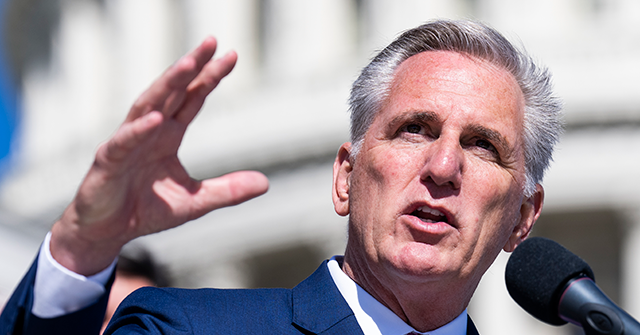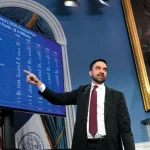

Congressional leaders stripped from the annual defense package a controversial proposal that would have allowed media organizations to create cartels to collectively bargain with Big Tech companies, text of the National Defense Authorization Act (NDAA) released on Tuesday evening shows.
The revelation that the Journalism Competition and Preservation Act (JCPA) has been stripped from the text of the NDAA after congressional leaders had agreed to include it just days ago is a massive development that comes after congressional leaders were caught off guard by the swift and severe blowback to the effort, Breitbart News has learned.
The removal of the proposal is a massive win for conservatives after sweeping criticism from across the political spectrum came in in the wake of reports that Senate GOP leader Mitch McConnell had caved to Democrats on this, but particularly criticism among Republicans, who were shocked leaders had agreed to include the Journalism Competition and Preservation Act (JCPA) in the National Defense Authorization Act (NDAA).
Several GOP senators joined in the chorus of critics in public and in private, ripping the push to shred and delay the release of the NDAA’s final text by more than a full day and throwing the final weeks of this lame duck Congress into disarray.
Senate GOP leader Mitch McConnell in particular, multiple sources with knowledge of the matter told Breitbart News, was caught flat-footed in response after he had this weekend acquiesced to demands from Senate Majority Leader Chuck Schumer and outgoing House Speaker Nancy Pelosi to include the JCPA in the NDAA. Only House GOP leader Kevin McCarthy, the likely next Speaker of the House, was fighting it all along among the vaunted “Four Corners”–the so-called four leaders of the two chambers of Congress.
When Breitbart News broke the story on Monday morning, though, that McCarthy was outvoted three to one among the congressional leaders on this matter, pandemonium broke out among opponents of the JCPA, especially those on the right.
Criticisms rained down on the effort, particularly along the lines that not only did the JCPA policy-wise have nothing to do with America’s national defense, but that in reality the policy would weaken national security through loopholes that would boost the chief adversary of the United States the Chinese Communist Party (CCP).
Giving the media cartel power is bad enough.
The JCPA’s “China loophole” means this will benefit our adversaries.
All Republicans should oppose cramming this bad bill in the NDAA.https://t.co/2SO18ZuDxI
— Mike Pompeo (@mikepompeo) December 6, 2022
Senate Republicans, meanwhile, began organizing efforts to fight back. Sen. Tom Cotton (R-AR) swung into action and urged his GOP colleagues to filibuster the defense package if it contains the JCPA. Others, like Sens. Mike Lee (R-UT) and Thom Tillis (R-NC), issued public statements via Twitter saying they disagreed with including this in the NDAA.
The JCPA has no place in a defense authorization bill. This provision is simply a backroom deal to bail out Big Media for its failed business practices.
— Senator Thom Tillis (@SenThomTillis) December 6, 2022
GOP Senators debated the matter behind closed doors, too, in their weekly policy lunch, and the lack of any serious defense of the effort to include the JCPA and other extraneous proposals in the NDAA shocked McConnell as senators expressed outrage on the matter. McConnell, sources familiar with the matter say, began changing his tune in response to the GOP outrage later on Tuesday and insisting the NDAA be stripped of the JCPA.
Meanwhile, other critics of the legislation, like House Judiciary Committee ranking member Rep. Jim Jordan (R-OH) and the House Judiciary GOP threw haymakers against the plan via Twitter, ripping the plot.
You know what’s a REAL national security issue?
Not being able to meet our military’s recruitment goals because of the #COVID19 vaccine mandate on our troops.
Know what isn’t?
A Big Media bailout. https://t.co/PKEjqqhlRv
— House Judiciary GOP (@JudiciaryGOP) December 6, 2022
More voices joined the chorus too, including former President Donald Trump’s eldest son Donald Trump Jr. tweeting out a criticism of the JCPA saying it would lead to more censorship of conservatives and urging Republicans to rip it out of the NDAA.
Why are some Republicans working with Dems to destroy alternative media? This law gives Big Tech & the Corporate Media MORE censorship power. Strip it out of the NDAA!
Group of 10 GOP Patriots Push Back on McConnell, Democrat Push to Include JCPA in NDAAhttps://t.co/Qgcq9imNMk
— Donald Trump Jr. (@DonaldJTrumpJr) December 6, 2022
“Why are some Republicans working with Dems to destroy alternative media?” asked Don Jr. “This law gives Big Tech & the Corporate Media MORE censorship power. Strip it out of the NDAA!”
Others, like conservative groups including FreedomWorks and Americans for Tax Reform (ATR), joined the push to strip the JCPA out of the NDAA via tweets and letters.
The JCPA (pure cronyism that runs counter to the idea of an open internet) should not be tagged onto the #NDAA; it should be voted on as a standalone bill. #ampFW ➡️ https://t.co/DNidwpdKzy pic.twitter.com/D9iYrNi9Y4
— FreedomWorks (@FreedomWorks) December 6, 2022
Reason magazine, the voice of the libertarian movement in the U.S., also came out against the bill, echoing FreedomWorks’ characterization of the JCPA as “cronyism.”
“The worst ideas in Congress never die; they just get sneaked into unrelated bills,” wrote Reason senior editor Elizabeth Nolan Brown. “This week, that means lawmakers are reportedly trying to burrow a bad media protectionism bill into defense spending authorization.”
Other organizations on the center right, including the Niskanen Center and R Street Institute, signed on to an open letter opposing the last-ditch JCPA effort with 25 other organizations from across the political spectrum.
Given that populists like Sen. Josh Hawley (R-MO), whose populist politics are often a source of consternation for libertarians, also opposed the JCPA over its weakening of antitrust laws, it looks like every part of the political right has a reason to oppose this bill.
Over at Fox News, Laura Ingraham, host of The Ingraham Angle, called the push to add the JCPA to a defense spending bill “disturbing.”
“Now this defense bill will as usual be so long, and the text released so late that few members will actually read it, and even fewer tally up all the waste,” said Ingraham. She went on to say:
But Breitbart uncovered something disturbing tucked inside it – something called the Journalism Competition and Preservation Act in the National Defense Authorization Act. Now, it will allow media companies – most owned by wealthy conglomerates – to form negotiating cartels to secure special favors from Big Tech companies, including some financial handouts.
Don’t for a second think that they hadn’t planned this all. Staff on the hill and at the White House have undoubtedly been working away at all of this nonsense for probably most of the last year.
Meta’s Mark Zuckerberg also waded into the fray, releasing a statement on Monday warning that Facebook may have to remove news from the platform altogether if the alternative is to be forced into binding agreements with a corporate media cartel as the result of the JCPA.
Even the left is up in arms about the bill. Despite attempts by media lobbyists to frame the bill as a rescue package for struggling journalists, the media unions who represent those journalists were not convinced, slamming the JCPA as a handout for the hedge fund owners of media conglomerates, not frontline journalists.
This argument was echoed by the left-leaning nonprofits, including the influential ACLU, over 25 of which signed on to an open letter on Monday opposing the attachment of the JCPA to the NDAA.
From the open letter:
Large media conglomerates can dominate negotiations, and small outlets would be unheard if not hurt,” wrote the organizations in their open letter. Despite claims that the bill is ‘designed to benefit small and local publishers exclusively,’ a publisher employee cap of 1,500 would exclude only the nation’s three largest newspapers from participating in negotiations (and as noted below, the cap doesn’t apply to broadcasters at all).
The “one publisher, one vote” provision for negotiating entities underplays the forms of soft power large conglomerates with brand-name news outlets can bring to the negotiations. In fact, the bill encourages — and may help fund — more consolidation among both newspapers and broadcasters.
No matter where you look on the ideological compass – left, right, MAGA, moderate, populist, libertarian –we find vocal opposition to the JCPA, and bipartisan agreement that the bill is nothing more than corporate welfare for the world’s wealthiest media companies and their hedge fund owners. It seems the only friends the media industry and its well-funded lobbyists have are their lackeys in Congress.
From here, the path forward for the JCPA is unclear. Now that it is out of the NDAA, leaders could try to attach it to a spending bill like an omnibus or a continuing resolution (CR)–an omnibus is a far likelier place than a CR for something like this–or they could try to pass it as a standalone bill. But the clock is ticking on this Congress and the window for moving the JCPA is becoming smaller by the second.
Allum Bokhari is the senior technology correspondent at Breitbart News. He is the author of #DELETED: Big Tech’s Battle to Erase the Trump Movement and Steal The Election.




